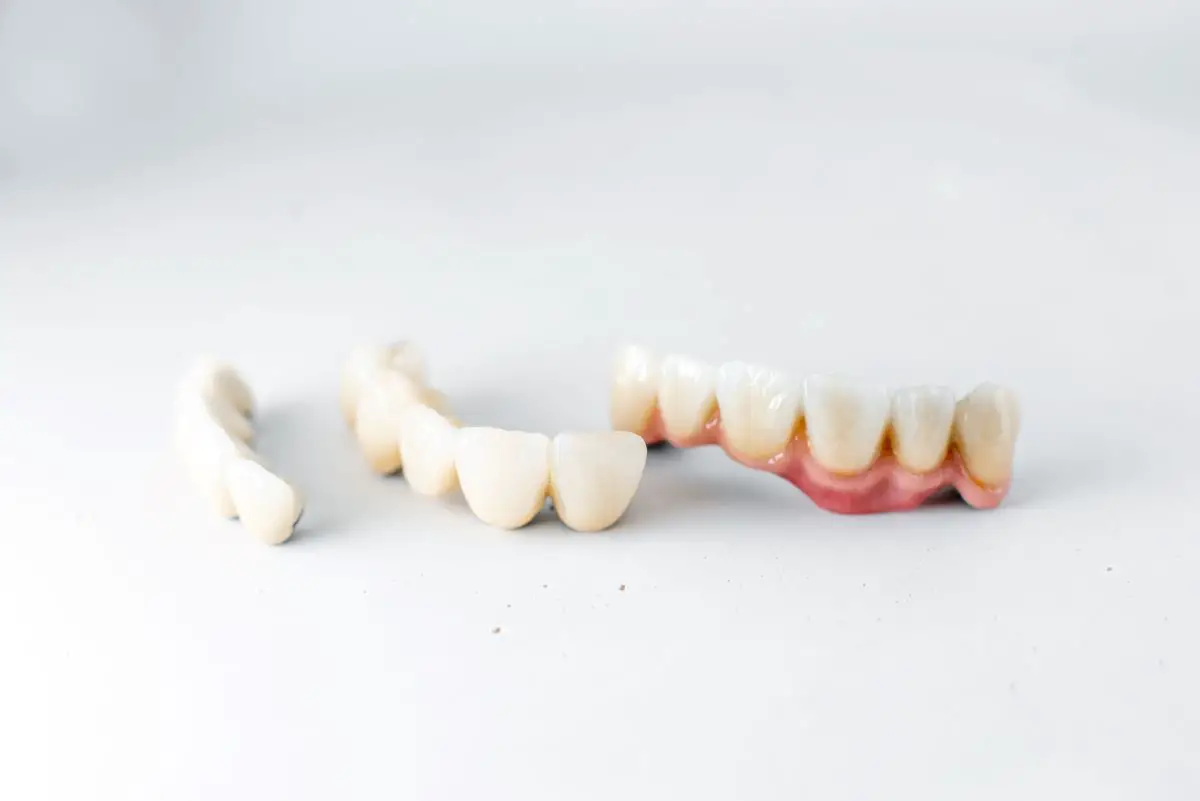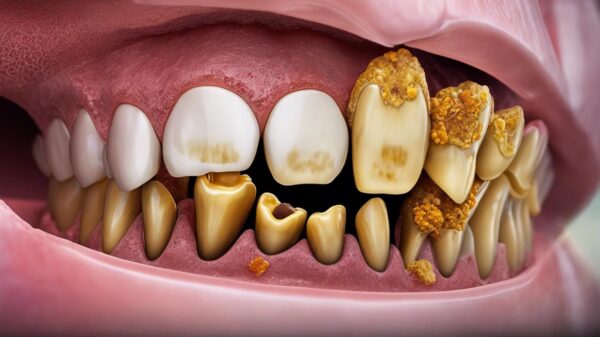A dental crown is a restoration that covers and strengthens a tooth that has been damaged or weakened. Crowns are made of different materials, including porcelain, gold, and metal alloys. Crowns can last for many years with proper care. In this blog post, we will discuss how long a dental crown procedure usually lasts and what you can do to make sure your crown lasts as long as possible!
What Is The Length Of Time A Dental Crown Will Stay Together?
The answer to this question depends on a few factors. However, in most cases, a dental crown procedure takes about two hours. However, if you choose a porcelain dental crown and your tooth requires additional treatment, the procedure may take longer. Your dentist will be able to give you a more accurate estimate of the length of the procedure based on your case.
Let’s talk a bit more about what may cause this process to take longer or shorter. We will also go over what you can expect during this procedure and how to take care of your teeth afterward.
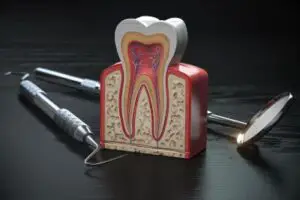 What Is A Dental Crown Procedure?
What Is A Dental Crown Procedure?
A dental crown procedure is a dental procedure in which a crown (a cap) is placed over a tooth to restore its shape, size, and strength. The goal of this procedure is to improve the appearance of the tooth and to protect it from further damage.
The reason some individuals need to get a dental crown procedure is that their tooth has been damaged or weakened. This damage can be caused by many things, including:
-Tooth decay
-Fractured teeth
-Worn-down teeth
-Misshapen teeth
-Discolored teeth
The Process Of A Dental Crown Procedure
To better understand how long a dental crown procedure might take, it’s important to understand the process of this procedure.
- The first step is to examine your mouth and take x-rays.
- Then, they prep the tooth. This involves removing any damaged or decayed tissue.
- Once the tooth has been prepped, an impression will be made. This impression will be used to create your custom crown.
- While your crown is being made, you will be given a temporary crown. The temporary crown will protect your tooth and help to maintain your bite while you wait for your permanent crown.
- Once your permanent crown is ready, you will return to the dentist to have it placed. The crown will be checked for fit and then cemented into place.
In most standard situations, this whole procedure will take about two hours. However, as we mentioned before, there are a few factors that can cause the procedure to take longer or shorter.
A Longer Procedure
A few situations may cause this procedure to take longer. For example, if you choose a porcelain crown. This is because porcelain is a more delicate material and requires more time to place correctly.
Additionally, if your tooth requires additional treatment, the procedure will take longer. For example, if your tooth is severely damaged or decayed, your dentist may need to place a root canal before they can place the crown.
A Shorter Procedure
On the other hand, there are also a few situations that may cause the procedure to be shorter. For example, if you have a metal alloy crown. This is because metal alloys are stronger and require less time to place correctly.
Additionally, if you have a dental implant, the procedure will be shorter. This is because there is no need to prep the tooth before placing the crown.
What To Expect During The Procedure
Now that we’ve gone over how long the procedure might take, let’s talk about what you can expect during the procedure. After your initial evaluation, your dentist will likely offer options to make you more comfortable. This may include numbing agents or sedatives. It is not usual to be completely under for this procedure, a numbing agent to your mouth is typically just fine.
After the dentist has finished prepping your tooth, they will take an impression. This is done by placing a soft, pliable material in your mouth and having you bite down on it. Once the material has hardened, it will be removed from your mouth and used to create your custom crown.
Once your permanent crown is ready, you will return to the dentist to have it placed. The crown will be checked for fit and then cemented into place.
You can expect the procedure to be relatively painless. However, you may experience some discomfort afterward. This is normal and should dissipate within a few days.
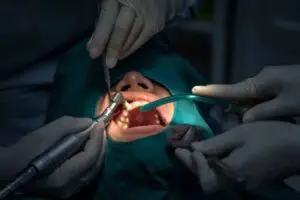 Recovery After A Dental Crown Procedure
Recovery After A Dental Crown Procedure
After your procedure, you will likely be given specific instructions on how to care for your mouth. This may include:
-Brushing and flossing regularly
-Avoiding hard or sticky foods
-Not smoking
It is also important to avoid placing too much pressure on your teeth. This means no chewing on ice or biting your nails. You should also avoid using any whitening products on your teeth. This is because they can cause the crown to become discolored.
The Different Types Of Crowns
When it comes to dental crowns, you have a few different options! The three most common types of crowns are:
-Porcelain
-Porcelain-fused-to metal
-Zirconia
The type of crown you choose will be based on a few different factors. These include:
-The location of the tooth
-The health of the tooth
-The alignment of the bite
-Your personal preference
Although any of the above options will do the job they are meant to, it is important to know the differences and advantages of them all. If you have any questions or concerns about which type of crown is right for you, be sure to talk to your dentist. They will be more than happy to help you make the best decision for your smile!
Tips For Making Your Crown Last Longer
While dental crowns are designed to last a long time, there are a few things you can do to make sure yours lasts even longer.
-Brush and floss regularly
-Visit your dentist for regular checkups
-Avoid chewing on hard objects
-Do not use your teeth as tools
By following these simple tips, you can help to ensure that your crown lasts for many years to come.
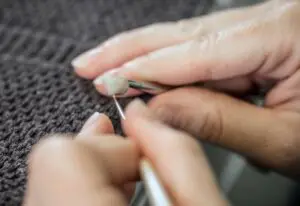 Signs Your Dental Crown Needs Replacing
Signs Your Dental Crown Needs Replacing
Even with proper care, there may come a time when your crown needs to be replaced. Most dental crowns last around five to fifteen years. However, there are a few signs that may indicate it is time for a new one sooner. These include:
-Changes in color
-Cracks or chips
-Persistent pain or discomfort
-Sensitivity to hot or cold temperatures
-Visible damage to the crown
-Loose-fitting crown
If you experience any of these symptoms, it is important to contact your dentist right away. They will be able to determine if the crown needs to be replaced or if there is another issue that needs to be addressed.
Is A Dental Crown Procedure Worth It?
And now that we have answered all your questions about dental crowns and how long a dental crown procedure lasts, you may be wondering if the procedure is worth it. The answer to this question is yes!
Dental crowns are a great way to protect your teeth and improve your smile. They are also a very affordable option when compared to other dental procedures. If you are experiencing any pain or discomfort in your mouth, it is important to contact your dentist right away. They will be able to determine if a dental crown is right for you.
We hope this article has helped answer your questions about dental crowns! If you are considering a dental crown, be sure to talk to your dentist about all your options.
Related Questions
How Much Does A Dental Crown Cost?
The cost of a dental crown will vary depending on the type of crown you choose and the dentist you see. Porcelain crowns tend to be more expensive than metal alloys. Additionally, the location of the tooth will also affect the cost.
How Do I Know If I Need A Crown?
A few factors will contribute to whether or not you need a crown. This includes the severity of the damage or decay, the location of the tooth, and your personal preference. Your dentist will be able to help you determine if a crown is right for you.
What Are The Different Types Of Dental Crowns?
The three most common types of dental crowns are metal alloys, porcelain-fused-to-metal, and all-ceramic. Metal alloys are the strongest type of crown but are also the most visible. Porcelain-fused-to-metal crowns are a good middle ground. They are not as strong as metal alloys but are less visible. All-ceramic crowns are the weakest type of crown but are also the most natural-looking.
What Is The Difference Between A Crown And A Filling?
A dental filling is used to restore a tooth that has been damaged by decay. A crown is used to cover a tooth that is damaged or decayed. Crowns are also used for cosmetic purposes.
– the article sponsor is DA of Athens



